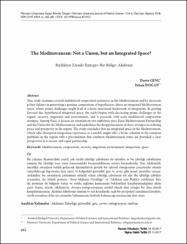| dc.contributor.author | Genç, Deniz | |
| dc.contributor.author | Doğan, Erhan | |
| dc.date.accessioned | 2022-02-23T12:36:23Z | |
| dc.date.available | 2022-02-23T12:36:23Z | |
| dc.date.issued | 2018 | en_US |
| dc.identifier.citation | Genç, D. ve Doğan, E. (2018). The mediterranean: Not a union, but an integrated space? Marmara University Journal of Political Science, 6(Özel Sayı), 62-81. https://dx.doi.org/10.14782/ipsus.421013 | en_US |
| dc.identifier.issn | 2147-6926 | |
| dc.identifier.uri | https://dx.doi.org/10.14782/ipsus.421013 | |
| dc.identifier.uri | https://hdl.handle.net/20.500.12511/8981 | |
| dc.description.abstract | This study examines several multilateral cooperation initiatives in the Mediterranean and by discussing their failures in generating a genuine cooperation, it hypothesizes about an integrated Mediterraneanspace, where prime challenges might lead to a loose functional framework of integration. In puttingforward this hypothetical integrated space, the study begins with discussing prime challenges in theregion: security, migration and environment, and it proceeds with early multilateral cooperationattempts. Among these, it focuses its attention on two ambitious ones: Euro-Mediterranean Partnershipand the Union for the Mediterranean, and underlines the disappointments in these attempts in realizingpeace and prosperity in the region. The study concludes that an integrated space in the Mediterranean,which takes European integration experience as a model, might offer a better solution to the commonproblems in the region with a precondition that southern Mediterranean states are provided a clearperspective in a sincere and equal partnership. | en_US |
| dc.description.abstract | Bu çalışma Akdeniz’deki çeşitli çok taraflı işbirliği çabalarını ele almakta ve bu işbirliği çabalarının samimi bir işbirliği tesis etme konusundaki başarısızlıklarını ortaya koymaktadır. Yazı Akdeniz’de öncelikli sorunlara odaklı gelişecek dinamiklerin gevşek bir işlevsel entegrasyon çerçevesine olanak tanıyabileceği hipotezini ileri sürer ve bölgedeki güvenlik, göç ve çevre gibi temel sorunları tartışır. Ardından, bu sorunların çözümüne yönelik erken işbirliği çabalarını ele alır. Bu işbirliği çabaları arasından, iki iddialı projeye, “Avro-Akdeniz Ortaklığı” ve “Akdeniz için Birlik”e odaklanır. Her iki projenin de bölgede barışı ve refahı sağlama konusunda beklentileri karşılayamadığının altını çizer. Sonuç olarak, Akdeniz’in, Avrupa entegrasyonunu model olarak alan entegre bir alan olarak kurgulanmasının, Akdeniz ülkelerine samimi ve eşit koşullarda, açık bir perspektif sunulması kaydıyla, ortak sorunlara daha iyi çözümler bulunmasına katkıda bulunacağı önermesini ileri sürer. | en_US |
| dc.language.iso | eng | en_US |
| dc.publisher | Marmara University | en_US |
| dc.rights | info:eu-repo/semantics/openAccess | en_US |
| dc.subject | Mediterranean | en_US |
| dc.subject | Cooperation | en_US |
| dc.subject | Security | en_US |
| dc.subject | Migration | en_US |
| dc.subject | Environment | en_US |
| dc.subject | Integration | en_US |
| dc.subject | Space | en_US |
| dc.subject | Akdeniz | en_US |
| dc.subject | İşbirliği | en_US |
| dc.subject | Güvenlik | en_US |
| dc.subject | Göç | en_US |
| dc.subject | Çevre | en_US |
| dc.subject | Entegrasyon | en_US |
| dc.subject | Mekan | en_US |
| dc.title | The mediterranean: Not a union, but an integrated space? | en_US |
| dc.title.alternative | Birlikten ziyade entegre bir bölge: Akdeniz | en_US |
| dc.type | article | en_US |
| dc.relation.ispartof | Marmara University Journal of Political Science | en_US |
| dc.department | İstanbul Medipol Üniversitesi, İnsan ve Toplum Bilimleri Fakültesi, Siyaset Bilimi ve Uluslararası İlişkiler Bölümü | en_US |
| dc.authorid | 0000-0001-6319-8315 | en_US |
| dc.identifier.volume | 6 | en_US |
| dc.identifier.issue | Özel Sayı | en_US |
| dc.identifier.startpage | 62 | en_US |
| dc.identifier.endpage | 81 | en_US |
| dc.relation.publicationcategory | Makale - Ulusal Hakemli Dergi - Kurum Öğretim Elemanı | en_US |
| dc.identifier.doi | 10.14782/ipsus.421013 | en_US |
| dc.institutionauthor | Genç, Deniz | |
| dc.identifier.trdizinid | TWpreE16UTJOZz09 | en_US |


















